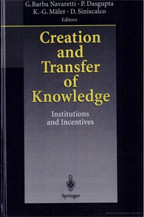Creation and transfer of knowledge: institutions and incentives

01.02.1998
Giorgio Barba Navaretti, Partha Dasgupta, Karl-Göran Mäler, Domenico Siniscalco
Springer-Verlag
Is knowledge an economic good? Which are the characteristics of the
institutions regulating the production, and the diffusion of knowledge?
This volume adopts a multidisciplinary approach to bring knowledge at
the forefront, as a key economic issue. No economic endeavour can be
undertaken without learning and acquiring information. Cumulation of
knowledge is a key determinant of economic growth, but the
microeconomics of this process is still relatively underexplored. Only
recently knowledge has moved at the core of most new developments of
economic analysis. The methodology and the results developed by this
recent literature also bear profound insights for events like scientific
progress, artistic and craft development which have rarely been
addressed as socio-economic institutions and which have generally been
the domain of sociologists and historians rather than economists. The
present collection is aimed precisely at studying the similarities and
differences in these endeavours which are generally been analysed as
isolated events. The papers included are not comprehensive surveys, but
sketches, examples of how different disciplines deal with the same
subject. They examine property rights on innovation in technology,
visual arts and music; the characteristics of agreements to carry out
co-operative research and development between and within firms; the
dynamics of research networks; institutions for education and training;
the impact of communication techniques on the diffusion of knowledge;
knowledge transmission through North-South transfers of technology.
Contributors: P. Aghion, G. Barba Navaretti, G.
Bertola, A. Bigano, I. Bignamini, M. Blomström, E. Castelnuovo, D. Coen
Pirani, P. A. David, J. Goody, R. Henderson, M. Hollingsworth, A. B.
Jaffe, B. Jovanovic, A. Kokko, J. R. Markusen, Y. Nyarko, A. Patel, J-F.
Thisse, J. Tirole, M. Trajtenberg, A. J. Venables, Y. Zenou
Is knowledge an economic good? Which are the characteristics of the institutions regulating the production, and the diffusion of knowledge? This volume adopts a multidisciplinary approach to bring knowledge at the forefront, as a key economic issue. No economic endeavour can be undertaken without learning and acquiring information. Cumulation of knowledge is a key determinant of economic growth, but the microeconomics of this process is still relatively underexplored. Only recently knowledge has moved at the core of most new developments of economic analysis. The methodology and the results developed by this recent literature also bear profound insights for events like scientific progress, artistic and craft development which have rarely been addressed as socio-economic institutions and which have generally been the domain of sociologists and historians rather than economists. The present collection is aimed precisely at studying the similarities and differences in these endeavours which are generally been analysed as isolated events. The papers included are not comprehensive surveys, but sketches, examples of how different disciplines deal with the same subject. They examine property rights on innovation in technology, visual arts and music; the characteristics of agreements to carry out co-operative research and development between and within firms; the dynamics of research networks; institutions for education and training; the impact of communication techniques on the diffusion of knowledge; knowledge transmission through North-South transfers of technology.
Contributors: P. Aghion, G. Barba Navaretti, G. Bertola, A. Bigano, I. Bignamini, M. Blomström, E. Castelnuovo, D. Coen Pirani, P. A. David, J. Goody, R. Henderson, M. Hollingsworth, A. B. Jaffe, B. Jovanovic, A. Kokko, J. R. Markusen, Y. Nyarko, A. Patel, J-F. Thisse, J. Tirole, M. Trajtenberg, A. J. Venables, Y. Zenou
